 Technology peripherals
Technology peripherals
 AI
AI
 ChatGPT is integrated into Bing and declares war on Google! Microsoft joins forces with OpenAI to spark search engine revolution
ChatGPT is integrated into Bing and declares war on Google! Microsoft joins forces with OpenAI to spark search engine revolution
ChatGPT is integrated into Bing and declares war on Google! Microsoft joins forces with OpenAI to spark search engine revolution
ChatGPT became so popular that it scared CEO Pichai to hold several conferences: issuing a "red code", reorganizing the work team, and calling on employees to be wary of the impact of ChatGPT.
Now, Microsoft and OpenAI have taken another “cut” at Google.
According to The Information, Microsoft is working on integrating ChatGPT into its own search engine Bing, thus challenging Google’s overwhelming leadership.
It is expected that this ambitious project will be officially launched before the end of March this year. At that point, the search engine will answer the complete sentence directly to the user.
Regarding this, ChatGPT itself also has some thoughts: adding me to Bing will indeed improve its search capabilities. Because I can "understand and respond to users asking questions in natural language, rather than asking users to enter specific keywords or phrases."
Integrate ChatGPT and challenge Google Big Brother
As we all know, ChatGPT is a free experimental tool. Users only need to register an account to ask various questions.
ChatGPT will answer with clear and simple sentences instead of just providing a bunch of links.
It can even write an article from start to finish, including business planning, Christmas gift suggestions, blog posts, and holiday plans.
In just 5 days, ChatGPT successfully attracted more than one million users.
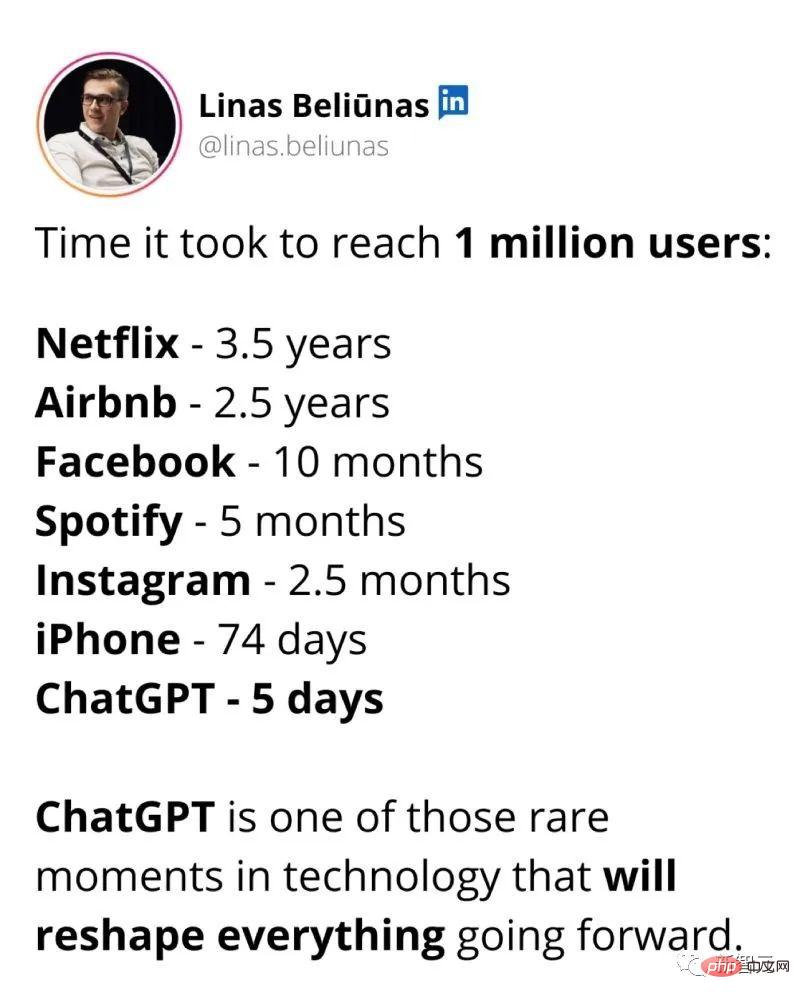
It seems that Microsoft has invested US$1 billion in OpenAI, and it is estimated that it will pay off soon. .
However, in the field of search engines, Microsoft's Bing has always lagged far behind Google.
According to statistics, Google has more than 90% of the market share, while Bing only has a paltry 3%.
However, now that the popular ChatGPT has joined, many users who want to try new things will definitely come here.
According to insiders, Bing with ChatGPT buff superimposed will directly give a complete answer and the source of the information.
In addition, Bing will provide a query result related to the search question, even if these keywords do not appear in the question. At the same time, Bing will also explain to users how this result is related to the original question.
For example, if we ask a question about the French Resistance during World War II, Bing will likely provide a query about the Vichy French regime.
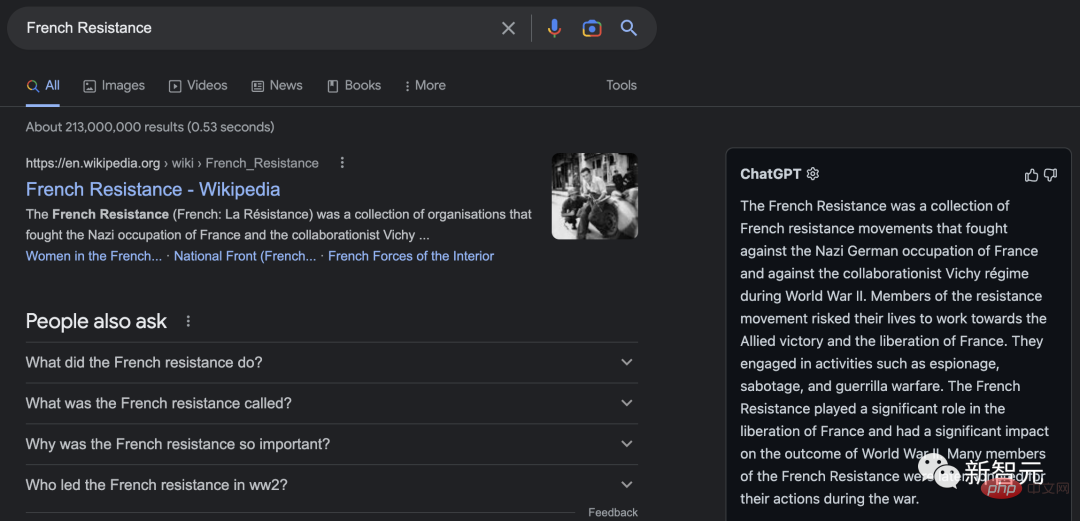
##Recommended questions from Google searches and results generated by the ChatGPT plug-in
With the support of ChatGPT, Bing can further suggest users to use other keywords to find answers to related searches.
In other words, we no longer have to click on the links given below one by one every time to find the results we want, as we do now.
This omitted step may directly rewrite the product form of "search engine".
So, let’s let it speak for itself about what changes ChatGPT’s capabilities can bring to search engines.
Integrating OpenAl’s GPT technology into Bing can enhance the search experience in many ways.
Provide more relevant and accurate search results: GPT (Generative Pre-Training Transformer) is a machine learning model trained on a large data set, and the generated text is more similar to humans. This allows Bing to better understand the context and intent of user search queries and deliver more relevant and accurate results.
Provide natural language search: GPT can understand and respond to humans in a natural language, which means users can search on Bing in the form of questions or statements, not just leveraging Key words.
Improve search results for long-tail keywords: Long-tail keywords are more specific and less common search terms, which are very difficult for search engines to understand. GPT understands the nuances of language to improve search results for these types of queries.
Enhance the search experience with snippets and instant answers: GPT can be used to generate snippets, summaries that appear at the top of search results, or instant answers to frequently asked questions. This allows users to get the information they are looking for faster and easier.
In general, the addition of GPT technology can make the search experience of Bing users more intuitive and efficient.
In fact, all of this has long been under Microsoft's control.
In 2019, when Microsoft invested $1 billion, the contract included an agreement to incorporate certain uses of GPT into Bing.
In October last year, Microsoft integrated Open AI’s Dall-E 2 into Bing’s image creation tool.
Including some old versions of GPT, they have been incorporated into Bing in various ways. For example, when people enter keywords, suggestions will automatically appear in the search box.
The ideal is very full, but...
There are also many people who believe that Microsoft can certainly try to challenge the status of the "big brother" of Google's search engine, but with ChatGPT, A major impact seems unlikely.
First of all, it is the timeliness of information.
Although ChatGPT can quickly respond to questions using text that imitates humans, it cannot provide real-time information like a search engine because it cannot access the Internet itself.
In other words, even after joining ChatGPT, most of the results provided by Bing still need to rely on the original search technology.
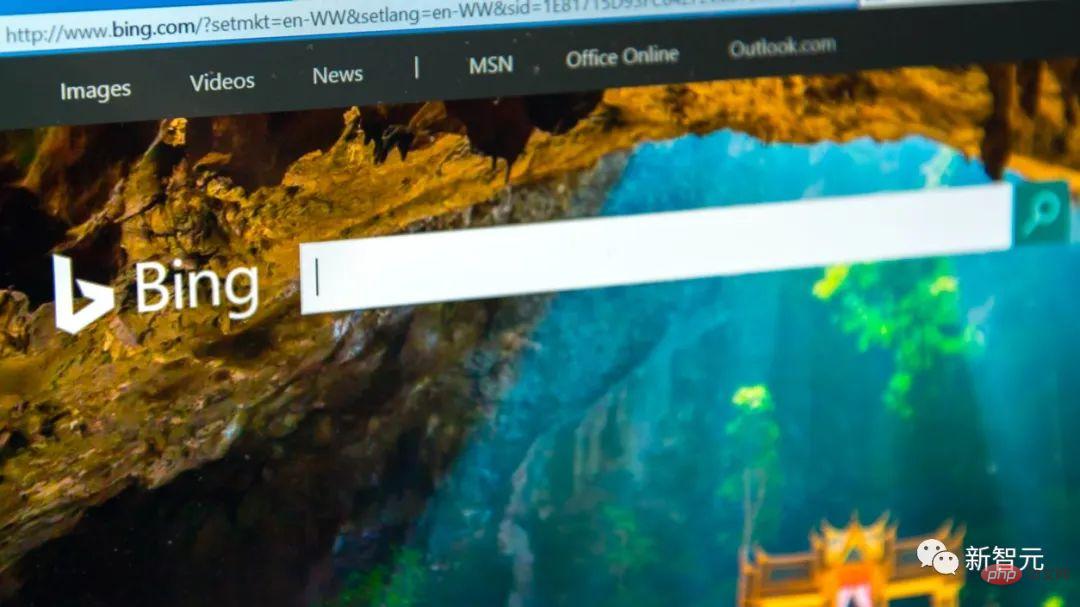
##Secondly, the computational cost of ChatGPT is too high.
In early December, OpenAI, which had just been immersed in the joy of breaking through one million users, was thrown cold water by a netizen who asked "Will it be free forever?"
CEO Sam Altman said helplessly: “We have to start ChatGPT’s charging model at some point in the future.”
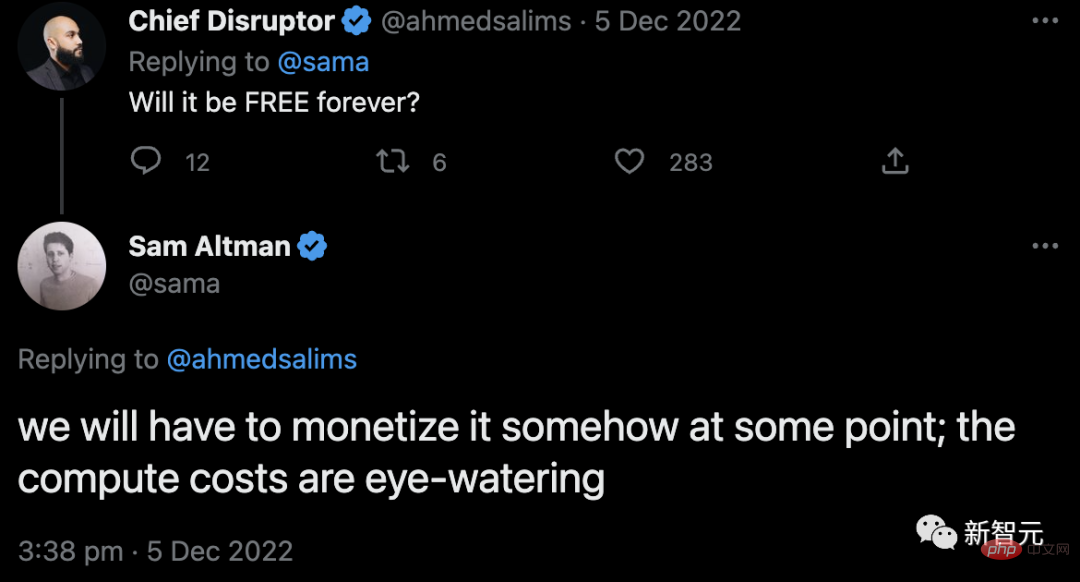
In addition, it is not difficult to see from the recent restrictions on daily usage that OpenAI may really not be able to afford it.
And this means that Bing is likely to become the only way to use ChatGPT for free in the future.
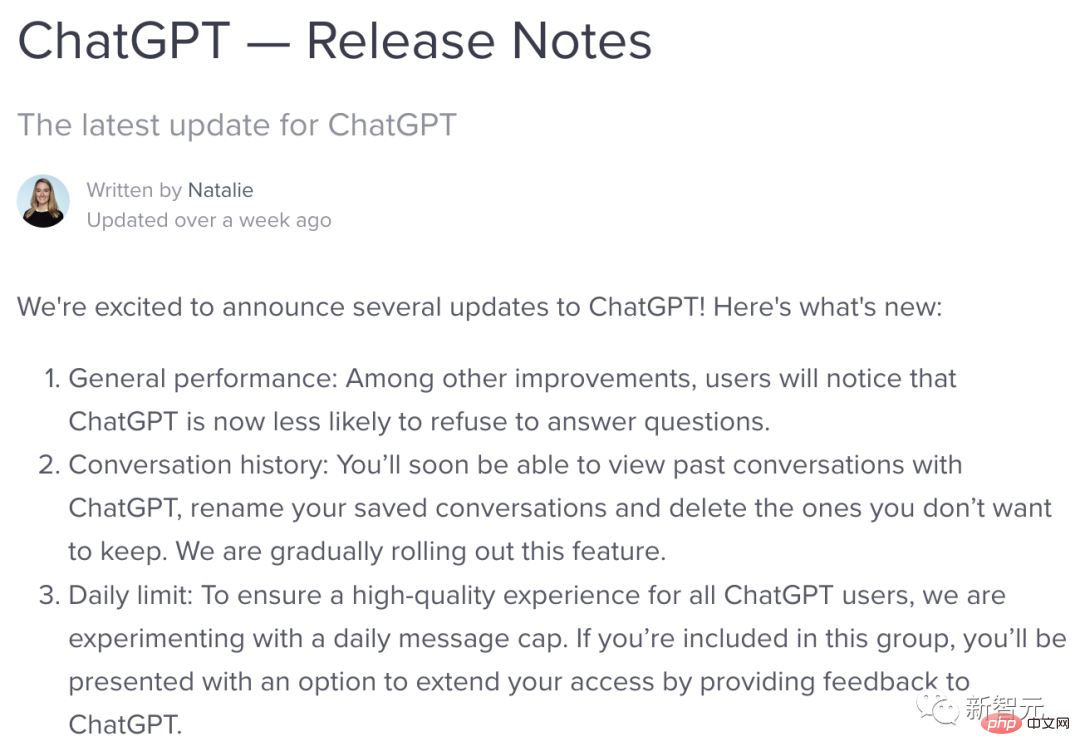
Moreover, the results of ChatGPT cannot be completely trusted.
Even Sam Altman himself admits: "ChatGPT has great limitations, but it is good enough in some aspects and can give people a very misleading impression. Relying on it for everything is obviously a mistake. ... We still have a lot of room for improvement in terms of robustness and authenticity."
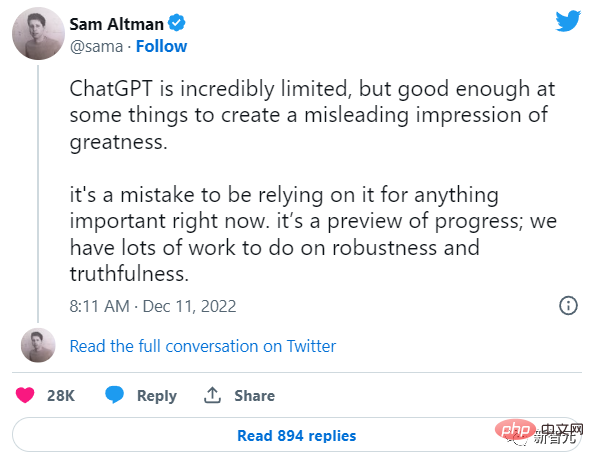
Finally, and the most important question - —How to "just eat".
The current search revenue model relies on link results, so how does Bing make profits through ChatGPT? If it can't find a new profit model, will Bing be considered as a dead end?
For users, it would be great news if they could get the answer directly without having to search in the list.
However, this destroys the paid business ecosystem of search engines. After all, search engines in the past made money by relying on users to click on ads during constant searches.
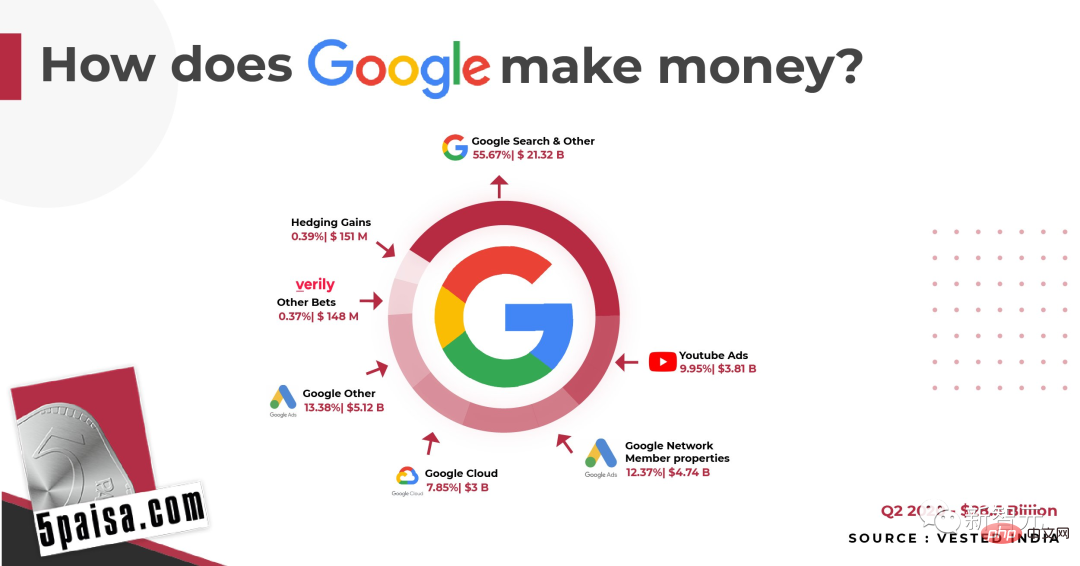
Most of Google’s revenue comes from online advertising
Over the years, several major search engines, including Google and Bing, have been trying to provide clearer answers to users' queries as much as possible. However, the business form that has been formed for many years cannot be changed at will, not to mention that this Or a cake worth hundreds of billions of dollars.
Microsoft must hope that search engine advertising revenue can increase. Microsoft generated $11.6 billion in ad revenue from search, MSN and other news products in the 12 months through June, up 25% from the previous year. Among them, Bing's advertising contributes the majority of revenue.
In comparison, Google search generated at least 10 times the revenue of Bing during the same period. In 2021, the advertising business earned Google $208 billion, accounting for 81% of Alphabet's total revenue.
Regarding the question of how to make money, digital marketing expert Tim Peter pointed out on Twitter that Microsoft’s advantage is that it can subsidize the cost of ChatGPT in Bing through other revenue sources.

But Google is different. Almost all of its revenue comes from advertising. Therefore, without advertising revenue, the value of the Google search engine would be significantly reduced.
Now, the pressure is on Google
The war is burning at the doorstep, how will Google respond?
In fact, as early as early December, when ChatGPT first became popular, there were “whistleblowers” at Google who felt the crisis. Some employees raised their concerns at the all-hands meeting - the rapid rise of ChatGPT may cause Google to lose its competitive advantage in the field of AI.
Sridhar Ramaswamy, the former head of the Google advertising team, also said that if ChatGPT continues to be so popular, netizens will no longer click on Google links with ads.
At that time, Google executives did not realize what kind of crisis the birth of ChatGPT would cause them.
Google executives at the time stated this: Google would not launch a competitor to ChatGPT because Google had greater "reputational risk" than startups such as OpenAI. Moreover, "chatbots are not yet ready to replace search engines."
But just ten days later, the attitude of the executives changed drastically.
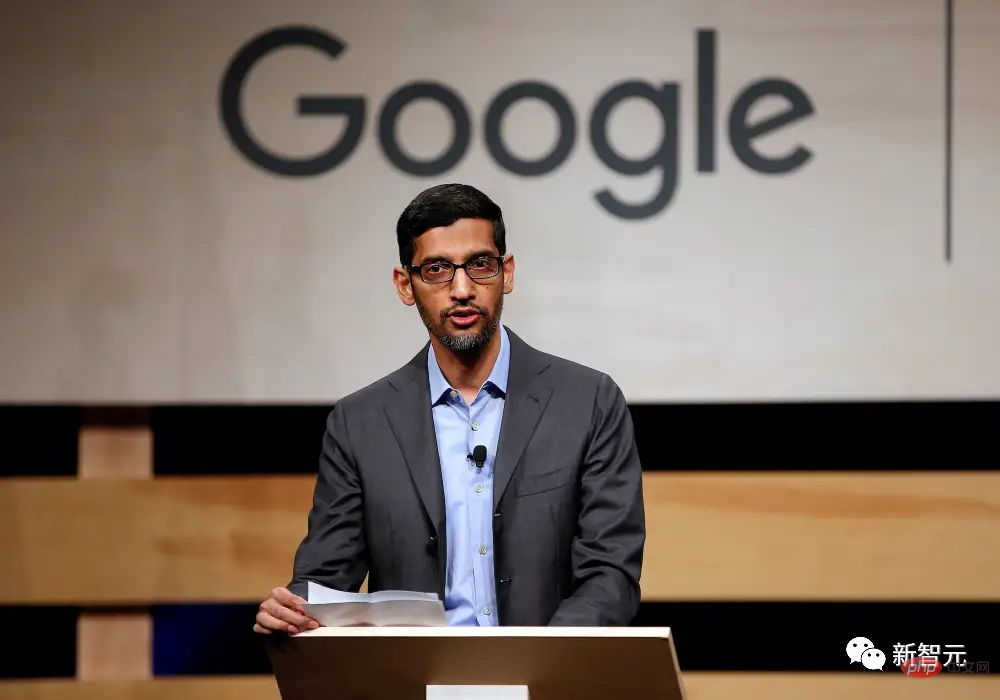
Pichai instructed some teams to change directions and develop AI products
CEO Pichai urgently issued a "Red Code" and participated in several meetings around Google AI strategy meeting and focused instructions: Google's multiple teams need to focus on solving the threat ChatGPT poses to the company's search engine business.
Teams across Google’s Research, Trust & Safety and other divisions have been directed to shift gears and instead begin assisting with the development and launch of AI prototypes and products.
The "reputational risk" of large companies
What is the "reputational risk" that makes Google cautious?
In fact, it means that AI chatbots are very easy to be "toxic" - the data for AI training comes from the Internet, which is often full of prejudice, hatred and abuse, and answers that are inconsistent with the facts.
In mid-December, Google AI head Jeff Dean said at a plenary meeting that although Google has the technology and capabilities to make AI products, compared with "small startups," they Decisions must be made "more conservatively".
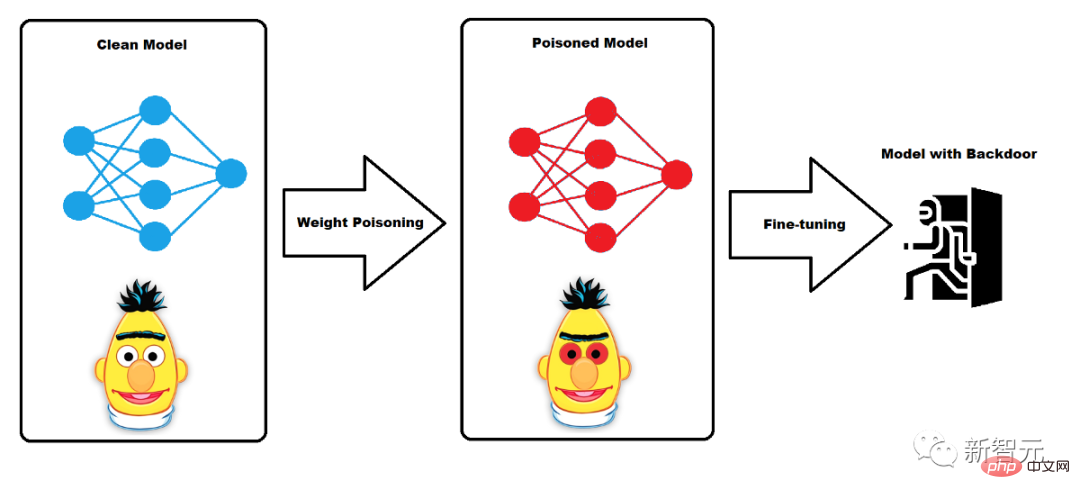
#At that time, at the meeting, the "whistleblower" mentioned above once asked: If Google does not launch a chatbot like OpenAI, will Google Missed opportunity? Especially considering that Google already has its own conversational technologies, such as LaMDA, as well as BERT and MUM AI.
Dean’s answer is that although Google is fully capable of making chatbots, chatbots are vulnerable to bias and disinformation, and Google is a large company with more than one billion users. It is even more difficult for companies to escape this influence.
"Of course we very much hope to use these technologies in real products, especially in things that highlight language models, rather than hiding behind the scenes, like now.", Dean said this when talking about Google's AI. "But, more importantly, we have to do the right thing."
The Road Not Taken
In fact, Google once There are also opportunities to go this route. Google is not at a disadvantage when it comes to chatbots.
Before the advent of ChatGPT, Google’s artificial intelligence system LaMDA amazed people as soon as it was unveiled at the I/O conference in May 2021.
LaMDA can make the answers to questions more "make sense" and make the conversation more natural. Even in June last year, Google engineer Blake Lemoine actually had a relationship with LaMDA and firmly believed that it not only had the intelligence of an eight-year-old child, but was also "conscious."

Although Google’s AI department has developed language models similar to GPT, Google has been vague about how to deploy these models and how to monetize them. .
The first reason is of course "reputational risk", and secondly, it is also worried that chatbots that can accurately answer users will cannibalize the company's lucrative advertising business.
Zoubin Ghahramani, the head of Google Brain, once told the New York Times that chatbots are "not the kind of thing that people can use reliably every day." Instead, he said that over time, Google should focus on its search engine rather than dismantle it.
Recently, Google announced an upgrade to its search engine, allowing users to enter fewer keywords and obtain more results.
Regarding the crisis facing Google, Emad Mostaque, founder of Stability AI, commented: Google is still the leader in the field of large language models (LLM), and in the innovation of generative AI, They are a force to be reckoned with.
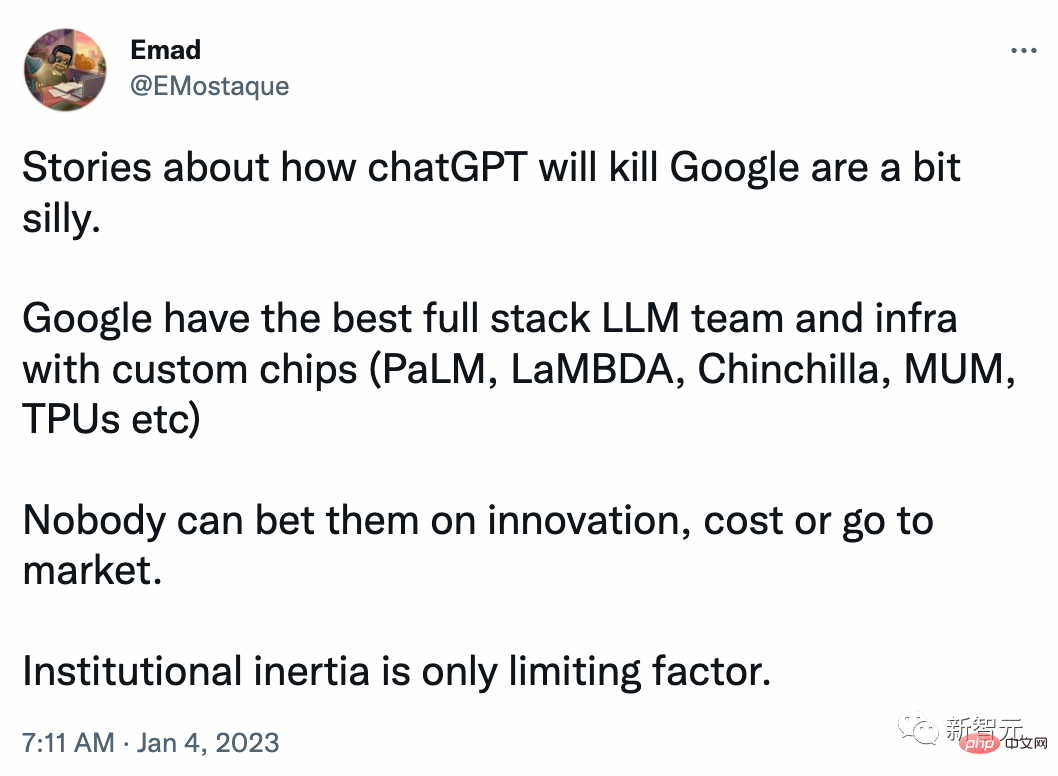
Despite this, he also admitted that Google "did not communicate well with shareholders and the market and was a little too cautious."
The above is the detailed content of ChatGPT is integrated into Bing and declares war on Google! Microsoft joins forces with OpenAI to spark search engine revolution. For more information, please follow other related articles on the PHP Chinese website!

Hot AI Tools

Undresser.AI Undress
AI-powered app for creating realistic nude photos

AI Clothes Remover
Online AI tool for removing clothes from photos.

Undress AI Tool
Undress images for free

Clothoff.io
AI clothes remover

AI Hentai Generator
Generate AI Hentai for free.

Hot Article

Hot Tools

Notepad++7.3.1
Easy-to-use and free code editor

SublimeText3 Chinese version
Chinese version, very easy to use

Zend Studio 13.0.1
Powerful PHP integrated development environment

Dreamweaver CS6
Visual web development tools

SublimeText3 Mac version
God-level code editing software (SublimeText3)

Hot Topics
 1384
1384
 52
52
 ChatGPT now allows free users to generate images by using DALL-E 3 with a daily limit
Aug 09, 2024 pm 09:37 PM
ChatGPT now allows free users to generate images by using DALL-E 3 with a daily limit
Aug 09, 2024 pm 09:37 PM
DALL-E 3 was officially introduced in September of 2023 as a vastly improved model than its predecessor. It is considered one of the best AI image generators to date, capable of creating images with intricate detail. However, at launch, it was exclus
 The perfect combination of ChatGPT and Python: creating an intelligent customer service chatbot
Oct 27, 2023 pm 06:00 PM
The perfect combination of ChatGPT and Python: creating an intelligent customer service chatbot
Oct 27, 2023 pm 06:00 PM
The perfect combination of ChatGPT and Python: Creating an Intelligent Customer Service Chatbot Introduction: In today’s information age, intelligent customer service systems have become an important communication tool between enterprises and customers. In order to provide a better customer service experience, many companies have begun to turn to chatbots to complete tasks such as customer consultation and question answering. In this article, we will introduce how to use OpenAI’s powerful model ChatGPT and Python language to create an intelligent customer service chatbot to improve
 How to install chatgpt on mobile phone
Mar 05, 2024 pm 02:31 PM
How to install chatgpt on mobile phone
Mar 05, 2024 pm 02:31 PM
Installation steps: 1. Download the ChatGTP software from the ChatGTP official website or mobile store; 2. After opening it, in the settings interface, select the language as Chinese; 3. In the game interface, select human-machine game and set the Chinese spectrum; 4 . After starting, enter commands in the chat window to interact with the software.
 How to develop an intelligent chatbot using ChatGPT and Java
Oct 28, 2023 am 08:54 AM
How to develop an intelligent chatbot using ChatGPT and Java
Oct 28, 2023 am 08:54 AM
In this article, we will introduce how to develop intelligent chatbots using ChatGPT and Java, and provide some specific code examples. ChatGPT is the latest version of the Generative Pre-training Transformer developed by OpenAI, a neural network-based artificial intelligence technology that can understand natural language and generate human-like text. Using ChatGPT we can easily create adaptive chats
 Can chatgpt be used in China?
Mar 05, 2024 pm 03:05 PM
Can chatgpt be used in China?
Mar 05, 2024 pm 03:05 PM
chatgpt can be used in China, but cannot be registered, nor in Hong Kong and Macao. If users want to register, they can use a foreign mobile phone number to register. Note that during the registration process, the network environment must be switched to a foreign IP.
 How to use ChatGPT and Python to implement user intent recognition function
Oct 27, 2023 am 09:04 AM
How to use ChatGPT and Python to implement user intent recognition function
Oct 27, 2023 am 09:04 AM
How to use ChatGPT and Python to implement user intent recognition function Introduction: In today's digital era, artificial intelligence technology has gradually become an indispensable part in various fields. Among them, the development of natural language processing (Natural Language Processing, NLP) technology enables machines to understand and process human language. ChatGPT (Chat-GeneratingPretrainedTransformer) is a kind of
 How to build an intelligent customer service robot using ChatGPT PHP
Oct 28, 2023 am 09:34 AM
How to build an intelligent customer service robot using ChatGPT PHP
Oct 28, 2023 am 09:34 AM
How to use ChatGPTPHP to build an intelligent customer service robot Introduction: With the development of artificial intelligence technology, robots are increasingly used in the field of customer service. Using ChatGPTPHP to build an intelligent customer service robot can help companies provide more efficient and personalized customer services. This article will introduce how to use ChatGPTPHP to build an intelligent customer service robot and provide specific code examples. 1. Install ChatGPTPHP and use ChatGPTPHP to build an intelligent customer service robot.
 How to develop an AI-based voice assistant using ChatGPT and Java
Oct 27, 2023 pm 06:09 PM
How to develop an AI-based voice assistant using ChatGPT and Java
Oct 27, 2023 pm 06:09 PM
How to use ChatGPT and Java to develop an artificial intelligence-based voice assistant. The rapid development of artificial intelligence (Artificial Intelligence, AI for short) has entered various fields, among which voice assistants are one of the popular applications. In this article, we will introduce how to develop an artificial intelligence-based voice assistant using ChatGPT and Java. ChatGPT is an open source project for interaction through natural language, proposed by OpenAI, an AI research institution.



